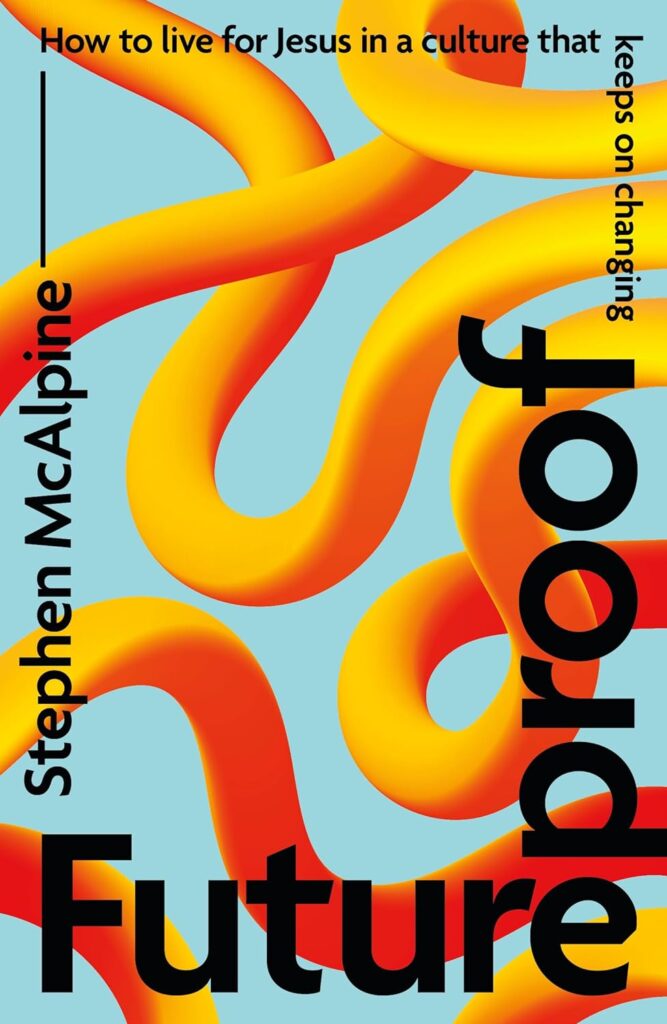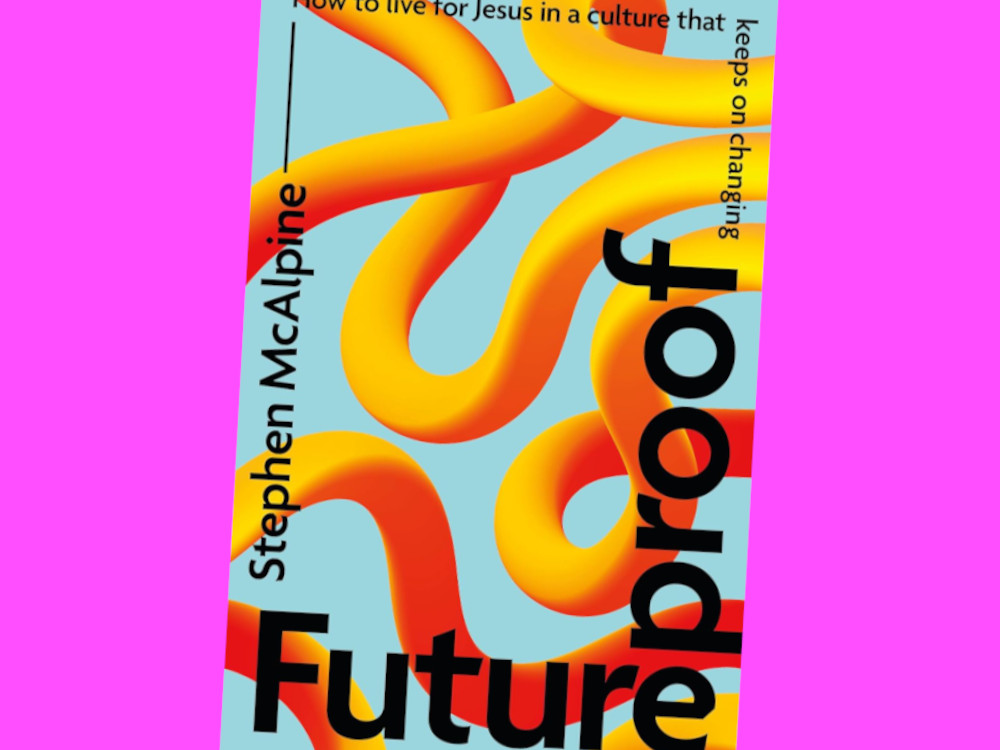Stephen McAlpine is not shy of pointing out the difficulties Christians have in the modern world. He wrote a whole book about us becoming the “Bad Guys”. But he doesn’t want to be known as a church whinger. That becomes clear in his latest book Futureproof. Here’s a taste of it.
Events catch us out. I began writing this book in my study, with sun streaming through the windows, my newsfeed filled with images celebrating the Platinum Jubilee of Queen Elizabeth II. There were articles recounting the 70-year reign of an iconic monarch; pictures of crowds of people across the United Kingdom holding street parties and draped in Union Flags; and messages of support and admiration from across the world and the political spectrum. President Joe Biden of the USA, President Emmanuel Macron of France, our newly elected prime minister in Australia, Anthony Albanese, and many others lined up to praise the amazing 96-year-old whose rule had spanned a period that began just after the Second World War.
In that first draft I wrote about the joyous celebrations, colourful and unanimous in their affirmation that her reign, just as much as the equally famous reign of
Elizabeth I back in the days of Shakespeare, was something worth celebrating. In the midst of all the tumult— internationally, nationally, and indeed personally within her own family—the queen had literally been regal, a steady hand in unsteady times.
Yet several months later, as I began editing this book, my daughter—who loved the queen—was texting me, worried that the monarch was about to die. It had been a constant concern for her as the queen had become frailer. And in fact, Elizabeth II did pass away that very day.
It turned out that the Platinum Jubilee celebrations were indeed the final hurrah. Not just for the queen, but for the way of life that she embodied, the values she espoused. The queen’s reign represented a period of change like no other in recent history, as we moved from the industrial age of World War II through a technological age in the Cold War era and into our current digital age. The Western world is incredibly different to the way it was when Elizabeth was crowned.
But the changes run deeper than that. Think about this: Elizabeth only became queen because her uncle, Edward VIII, abdicated so that he could marry the love of his life, the divorced American socialite, Wallis Simpson. Elizabeth’s father—and ultimately Elizabeth herself— only ascended the throne because the marriage of the king of England to a divorced woman was a bridge too far. The Church of England would not countenance it because Simpson’s ex-spouse was still living.
Yet now? The new king, Charles, divorced Princess Diana. He married his lover, the equally divorced Camilla Parker Bowles, whose ex-husband still lives. But there were no formal objections to Charles taking the throne—neither from Parliament nor from the Church of England.
Things have changed, and changed a lot. And of course, by the time you are reading this, things will have moved on apace. Change will have been our only constant. And clearly not always change for the better.
The shift in the moral standards that we demand from a king is only one symptom of the huge differences that now shape our world. It’s clear, for example, that we are more divided than ever. Every time a new prime minister or president arrives on the scene, they promise to bring unity—and that lasts a couple of weeks before the hostilities recommence. Division is deeply entrenched. Both sides of politics increasingly see the other as not simply wrong but “bad” or “evil”. Polls back this up. In the US, an Axios survey discovered that roughly half of Democrats and Republicans view the other side as both ignorant and spiteful, with a mere 2-4% viewing the other as “kind”, “fair” or “thoughtful”.1
Social media amplifies and rewards these divisions. We no longer read as widely as we once did, preferring to consume media that confirms what we already think, rather than pushing into ideas that we find troublesome or challenging to our view of the world. Meanwhile Twitter bots, created and backed by rogue governments,
are poisoning our politics. Smartphones and social media have radically changed how we communicate with each other and how we absorb information on everything, from what a politician did or didn’t say to what kind of nappies we should buy. The looming shadow of AI promises more changes still—with unresolved issues around copyright, privacy and employment just starting to peep over the horizon.
What about what it means to be human? It seems impossible nowadays for government health departments to define what a woman is—something that activists applaud, comedians mock, and corporations enforce. Parents are faced with radical “diversity programs” in their children’s schools. What do we do when our children announce that their best friend now has a different gender, or they themselves do?
Meanwhile, church attendance in Western countries is collapsing with the rise of the “nones” and the “dones”. In Australia in 2022, the proportion of people self- identifying as Christians shrank to 44%, down from 61% just ten years prior.2 This is repeated across the Western board.
Questions arise. Can our public ethics—grown as they are from biblical roots—be maintained in a post-Christian setting? For believers, what is going to happen as the Christian sexual ethic goes from being viewed as merely wrong to being denounced as bad, dangerous and unsafe? Is it only a matter of time before our governments and
courts legislate to remove children from parents deemed “unsafe” for holding to a Christian vision of human identity and flourishing? It seemed unthinkable a decade ago, but not now.
We can predict trends and patterns. We can watch decisions made in one year come to their logical conclusions in the next. But the pace of change and the sharp turns mean many of us are suffering from a cultural nausea. It would take an exceptionally confident person to say with any certainty what the next five years will look like, never mind the next 30. The future is a roller coaster, not a cable car. Strap yourself in!
The Future of King and Church
If you have read all of this without having heart palpitations, then check your pulse! Much of what I have described is very confronting—to Christians and secularists alike. It’s no surprise that the level of anxiety in the West has skyrocketed. My wife is a clinical psychologist, and she is booked out for months. During the delayed Tokyo Olympics in 2021, she made the point that if there were a mental-health Olympics, anxiety would be the absolute gold-medal winner. Anxiety lies over our Western culture like a pall.
Yet, as Christians, who are called not to be anxious both by Jesus and the New Testament writers, we have a sure foundation for the future, grounded in the resurrection
and return of King Jesus. Our King is one day coming to rescue his subjects, and he will usher in a new creation. This should make it possible for Christians to banish that crippling society-wide anxiety, replacing it with hope and confidence.
In fact, it was in the midst of their own turmoils in a brutal Roman Empire that the earliest Christians found their hope for the future. To their joy and surprise, they realised that the future had already begun in the resurrection of Jesus:
Blessed be the God and Father of our Lord Jesus Christ! In his great mercy, he has given us a new birth into a living hope through the resurrection of Jesus Christ from the dead, and into an inheritance that can never perish, spoil or fade. This inheritance is kept in heaven for you. (1 Peter 1 v 3-4)
Those words were written by the apostle Peter—a man who at one time was so anxious about his own personal future that he even lied about knowing Jesus (Matthew 26 v 69-75). What had changed? The resurrection had convinced Peter that Jesus was indeed God’s King and that if he could conquer death, there was nothing outside his power. This enabled Peter, from that point on, to live large! To live anxiety-free.
Now, of course, there is a type of anxiety that is part and parcel of every human life – perhaps about matters such as the health or fate of a loved one. The apostle Paul admitted to feeling anxiety in his concern for the church (2 Corinthians 11 v 28). But Paul’s anxiety was not the crippling, pervasive anxiety we see in our culture today. Australian pastor and author Mark Sayers sums this difference up:
In our day, anxiety has become one of the significant ailments of our world. Yet it is also a signal that something is desperately wrong in our world. We must differentiate between the individual mental health challenge of anxiety, which a minority of individuals in every culture experience, and the systemic anxiety that our contemporary culture’s structures create.3
Only a non-anxious structure can counter an anxious one. And the church can be a non-anxious structure, no matter what the circumstances of the future hold. It ought to be, given our understanding of Jesus and his kingship. As Paul wrote:
The Lord is near. Do not be anxious about anything, but in every situation, by prayer and petition, with thanksgiving, present your requests to God. And the peace of God, which transcends all understanding, will guard your hearts and your minds in Christ Jesus. (Philippians 4 v 5-7)
The Lord Jesus is not merely nearby in terms of proximity; he is nearby in terms of his return! The King is coming. We can pray to God and be guarded by his peace.
Paul’s words are not so different to the comfort that Jesus offered in Matthew 6:
Therefore I tell you, do not worry about your life, what you will eat or drink; or about your body, what you will wear … The pagans run after all these things, and your heavenly Father knows that you need them. But seek first his kingdom and his righteousness, and all these things will be given to you as well. (v 25, 32-33)
Anxiety about the future can be banished by the fact that God is our heavenly Father. God sits in heaven—and the key point here is not his distance from us but his rule over us. His is the kingdom. God has control of all things, even our futures. We don’t need to worry.
This lack of anxiety—or at least the conditions that can banish anxiety—must be Christianity’s best-kept secret! I am not sure that, if the general public were asked to provide some of the defining characteristics of the church, the term “non-anxious” would be top of the list. But it ought to be.
Being a Christian does not preclude worry or fear. We ought to take seriously the anxiety experienced by those with mental health issues within our church communities. Yet as an entity, we should not be defined by anxiety. Neither fear about the future nor anger about the increasingly post-Christian direction our Western culture is heading in should be features of a church confidently awaiting the day of Jesus’ return.

Futureproof: How to Live for Jesus in a Culture that Keeps on Changing
by Stephen McAlpine, the Good Book Company, $22.99 Available at The Wandering Bookseller

